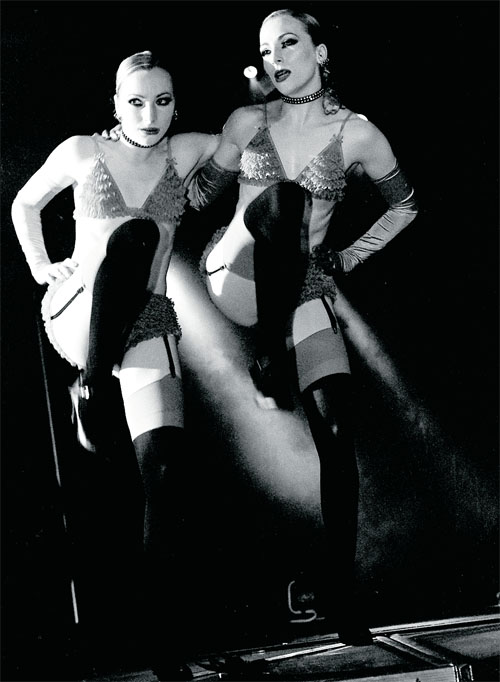
The Porcelain Dollz is the name of the Twinz musical persona. Currently self-produced, their music mixes an industrial feel with an ethereal solo-tonal quality—it’s relentlessly beat-oriented and deliberately ambient. “We create all our music electronically using keyboards, Korgs, and midi instruments,” they told me. “Technology has advanced so much that anyone can have an orchestra in their living room. It is pretty amazing what you can create. We started making our own music after becoming very frustrated with trying to collaborate with others, but not finding anyone who was really on the same page. We taught ourselves how to make beats. There are so many things to learn and we are expanding our knowledge and tapping into another side of our creative expression through the making of music. It’s something that has always been in us, and finding ways to bring it out is an amazing experience.”
The Twinz were introduced to Box owner and producer Richard Kimmel in 2007. “I remember our first rehearsal,” Kimmel says. “We had a huge fight when we suggested changes to their existing acts for the Box version. They were in no mood for direction and fur flew. We thought they might go back home that week. Thankfully, they persevered and grew to love our collaborative rehearsal process. Now the Twinz are a beloved and integral part of the Box family. Their fearless performances and unique presence have made the Twinz a signature element of our overall ambiance.”
Not satisfied to be performers, musicians, and film producers, the Twinz have yet another agenda. “The reality of being a stripper is that we are discriminated against, looked down upon, and could never list this occupation on a serious resume or application. In many instances, we had problems when trying to rent a house, obtain health insurance, and claim our taxes through an agent….We learned very quickly that this was job that we would have to hide from most of society if we wanted to avoid discrimination.”
Rather than hide and accept the discrimination, however, they boldly titled their joint autobiography Our Life in the Sex Industry. While it’s certainly true that sex sells, it’s also true that sex marginalizes, and the choice to identify as sex industry workers is less a marketing ploy than a declaration of their artistic and social roots.
“We take pride in having been in the sex industry, because it is an industry where only the strong survive,” they say. “If you can get through being in the sex industry without it chewing you up and spitting you out, then you are going to be able to handle anything in life. Being in the industry has changed our whole perspective on everything in our lives.”
Recently the Sex Workers’ Art Show has toured colleges and art galleries, selling out shows across the US, and the resurgence of burlesque in various cities has opened up venues for elaborate vignettes featuring politics, nudity, and humor. The Porcelain Twinz recently did a shoot for Italian Vanity Fair at the Slipper Room, a few blocks from the Box, which has been featuring burlesque, drag, and other controversial performances for nearly a decade and is still going strong. While still a bit short of the mainstream, the presence of adult-oriented shows every night of the week in major cities suggests a newly widespread enjoyment of performance art and less-polarized discussions about sexuality and sex industry than ever before. The Twinz are evidence of the growing appeal of performance art and sexually oriented performance in the US, and, like Dita Von Teese, they have shown that an entrepreneurial edge can help sex-industry workers find a unique place in the performing arts.
While always perfectly in control of their business identity, the Twinz keep their eyes on the prize, the ability to express themselves in any artform they like. “Ultimately we create from inspiration with everything we do,” the Twinz say. “That is where all of our art comes from.”
It is an amazing time in the performing arts, when the women usually cast only as the inspiration—the models, the ethereal beauties of the Weimar Republic, the surreal circus lovelies—are able to claim their lives as their own inspiration.
And the most incredible part of it is that the viewer doesn’t even have to recognize any of this to watch them—the Porcelain Twinz’ performances work on so many levels, even the least sensitive patron at the club is going to remember their style and energy long after the credit-card bill for all those bottles has been paid and forgotten. And that’s what makes it worth getting behind those velvet ropes.
– Jo Weldon
